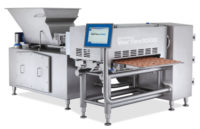Mark Haskins: MBA Poultry’s Extraordinary Business Pioneer
Mark Haskins, president and chief executive officer of Tecumseh, Neb.-based MBA Poultry, is not only living his professional dream but also taking the poultry industry to a new level of marketing potential. He spent 10 years with Ralston Purina before redirecting his ultimate career goal of running his own poultry company.
“I needed to build [my] resume and test my capacity to manage a company,” he says. To that end, he ran an integrated broiler operation in Jamaica for several years. He began negotiating his first broiler contract on Sept. 12, 1988, the same day Gilbert, a category 5 hurricane, devastated the island. “I have literally been in the eye of the storm,” he muses. “Rebuilding after the hurricane enabled us to modernize Jamaica’s poultry industry to the degree that it currently equals U.S. standards.” He took his quest for knowledge and experience to Guyana, a republic in South America, and then to central Europe as a consultant to help the Czech Republic integrate its poultry industry. His revelation concerning his professional dream came in 1994 while visiting a plant in suburb of Prague, capital and largest city of the Republic, where he first encountered air-chill technology.
Q: How do you define business and personal success in your life?
A: The retail space enjoyed by Smart Chicken [the MBA brand] is the basis of my success. It is retail space that many companies would like to be able to occupy. The value that we are able to obtain for our products is what we wanted and what we expected. The value has proved that the strategy is successful. The only way we would have succeeded was to create a truly identifiable niche to separate ourselves from the rest of the industry. A company our size cannot compete against the larger companies that really control the destiny of the industry. That is the reason this retail space is a good definition of our success.
Q: What leadership traits keep you on your game in your profession?
A: I try to employ traits of a keen listener, gentle guidance and a humble approach to all the challenges we have. I think that attracts people to a less stressful environment. When you [as the leader] communicate what you believe the best approach to be, I think there is a coming together with what is best for all concerned. I think this is an important leadership trait that I try to bring forward in my day-to-day decision-making process.
Q: Would the same kinds of leadership traits apply in your home life?
A: I would hope so. It might be best to ask my wife and grandchildren.
Q: What would you like your professional and personal legacy to be?
A: That he made a difference in people’s lives and the way I lived my life was an example of what is truly important.
Q: What are your greatest sources of professional and personal joy?
A: Developing skill sets of people beyond their own expectations on the professional side of the equation. On the personal side is my faith.
Q: What advice do you have for neophytes who may wish to emulate your career path?
A: I would suggest that they try their best to understand the risks associated with entering into a mature market. There are forces allied against them, but if they have the persistence and perseverance and the ability to create a niche in that mature market — go for it.
Q: The food business is dynamic but also chaotic at times, mainly due to outside market forces. Do you agree with this assessment?
A: There may be chaotic moments for all of us, but you can isolate yourself from many of those by being in a niche arena. It allows you to be somewhat removed from all those chaotic forces you cannot control, like Salmonella and the E.coli spinach situation.
Q: What is your definition of power?
A: Power should never be assumed. It has to be earned through leadership efforts. Many of us can get off center by [a skewed] perception of power. Many times when you have that perception of power, you have not earned it. Respect, credibility, character are qualities of power. Real power is about taking away from the personal side of the equation and putting it into the collective efforts of the people who are about what it is you are doing.
Q: What is a Captain of Industry in your view?
A: I hope it is something that says they are folks who made a difference and their approach to the marketplace has been as a captain’s would be — leading a group of folks with a common goal. If you are a successful captain, it means you have led the way like a pioneer.


Report Abusive Comment